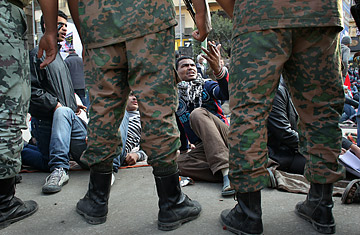
Two days after the resignation of President Hosni Mubarak, Egyptians in Cairo stage a Feb. 13, 2011, sit-in in response to the army's order to tear down encampments in Tahrir Square
The bare-chested 20-year-old Egyptian turns slowly to reveal a broad back that resembles a work of sadistic abstract art — a bloody, bruised composition of pink, red and purple. Long, deep gashes had been sliced through his skin; welts, pinker and more superficial, crisscross his body. His upper left arm is a mix of purples, a cufflike bruise that wraps all the way around his bicep. His right hand is bandaged, one of his fingers sprained. He runs his good hand over his closely shorn hair. His wavy locks, he says, were shaved off with glass shards by the same people who beat him.
On Wednesday, March 9, Khalid, who does not want his last name published, went down to Cairo's Tahrir Square, concerned about reports that thugs were attacking protesters in the iconic site where he had previously joined hundreds of thousands of his compatriots in the protests that brought down President Hosni Mubarak. He wanted to check on several friends among the hundreds of activists still camped out in the square to press the military government to meet the revolution's demands.
That afternoon, without warning, soldiers surged into the square behind what several witnesses said were lines of plainclothes thugs armed with metal pipes, electric cables and long, thick wooden rods. The uniformed and nonuniformed men reportedly worked in tandem, just like in Mubarak's days, rounding up hundreds of young men and women in an attack that lasted several hours, according to multiple accounts.
Khalid had been standing off to the side of the square, he says, when "a young baltagi" — Egyptian slang for a thug — pointed him out to several soldiers, yelling, "He's one of them." Within minutes, Khalid says, soldiers started punching him and two of his friends, before forcing them into the National Museum along with others grabbed on the square.
Human Rights Watch, quoting local activists, says that 190 of those detained were transferred to military prisons that day. Some, like Khalid and another Tahrir veteran, 33-year-old advertising executive Mahmoud Youssef, were released later that night, after being subjected to what Youssef and rights organizations say was hours of torture at the hands of the army and their plainclothes colleagues. About 153 still remain in custody, including 19 women.
Youssef says he was blindfolded, had his hands tied behind his back and was told to lie on his stomach. He was pummeled and kicked for hours with cables, pipes and other implements, in an account that meshes with what several other detainees have claimed. He doesn't understand why he was detained, given that the soldiers did not interrogate him. "They didn't even check my ID," he says. "I knew that the army was capable of this and that this was one of their methods. What I didn't expect was to be let go."
